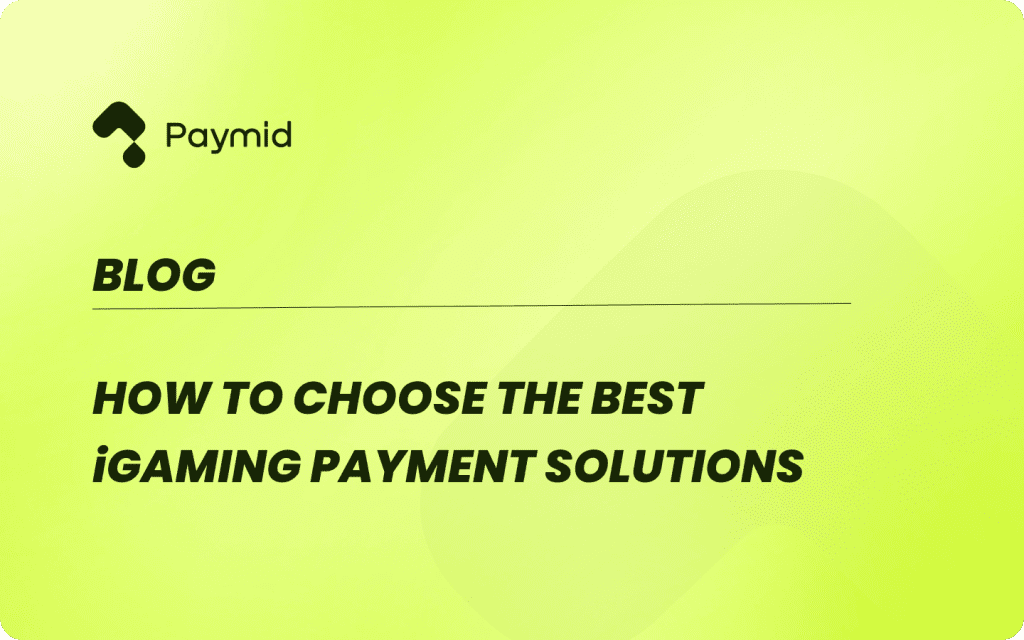How To Choose The Best iGaming Payment Solutions

Choosing the right payment solutions can make or break your success in this fast-paced industry. With the rise of cryptocurrencies and the need for seamless currency conversion, finding the perfect fit for your platform is more crucial than ever.
The right iGaming payment solutions not only streamline transactions but also boost your analytics capabilities and ensure compliance with ever-changing regulations.
⚡ Key Takeaways
Read More:
- How To Optimize SaaS Payment Processing For Maximum Efficiency
- Average Cart Abandonment Rate: Trends, Impact, & Solutions
- Merchant Initiated Transactions (MITs): Steps, Types & Compliance
- Network Tokenization: Benefits, Process & Implementation
Identifying Transaction Needs
To choose the best iGaming payment solutions, operators need to have a clear understanding of their transaction needs. This involves analyzing various aspects of their business operations and player preferences.
Volume of Transactions
The volume of transactions has a significant impact on the choice of payment solutions. iGaming platforms need to select methods that can handle their current transaction volume and scale as the business grows. Real-time transaction processing solutions offer the scalability to manage increasing transaction volumes efficiently, ensuring uninterrupted gameplay even during peak periods [1].
Type of Transactions (e.g., deposits, withdrawals)
Different types of transactions may require different payment methods. Here’s what operators should consider:
- Deposits: Offer a variety of options to cater to player preferences. This includes traditional methods like credit and debit cards, e-wallets, bank transfers, and emerging options like cryptocurrencies.
- Withdrawals: Ensure fast and secure withdrawal methods to enhance player satisfaction. According to a worldwide statistic, 41% of gamblers play online for enjoyment, making user experience paramount.
- Currency Conversion: Choose payment companies that handle currency conversion to simplify managing users’ money in a single currency, streamlining casino operations [2].
- Mobile Transactions: With the growth of mobile gaming, integrating popular mobile payment apps like Apple Pay and Google Pay can give operators a powerful edge [3].
To meet these diverse transaction needs, iGaming operators should implement multiple payment methods to provide a frictionless and secure user experience [2]. This approach not only caters to different player preferences but also ensures accessibility for players from various regions, especially if the platform serves an international audience.
Evaluating Security Features
When choosing iGaming payment solutions, evaluating security features is crucial to protect both the business and its players. This involves examining various aspects of security to ensure robust protection against potential threats.
Encryption and Tokenization
Encryption is a fundamental security measure that transforms sensitive data into unreadable codes during transmission and storage [4]. End-to-end encryption ensures that payment data remains protected from the point of entry to its final destination, preventing unauthorized access.
Tokenization, on the other hand, replaces sensitive data with unique tokens, minimizing the risk of data breaches [4]. This process involves substituting the original data with a token, a unique sequence that has no inherent meaning on its own [5].
Fraud Prevention Tools
To combat fraudulent activities, iGaming operators should prioritize payment solutions with advanced fraud detection mechanisms. These systems use a combination of machine learning and human-engineered rules to identify unusual behavior or suspicious activity in real time [5]. Real-time transaction monitoring is crucial for detecting fraudulent patterns and anomalies in transaction data.
Solutions with behavioral analytics can flag unusual behavior for investigation, while AI can improve operational efficiency and reduce false positives.
Some notable fraud prevention tools include:
- Salv Bridge: A collaboration platform that has shown effectiveness in real-time fraud detection, allowing fincrime teams across multiple institutions to work together [6].
- Mastercard’s Consumer Fraud Risk system: An AI-powered solution that uses real-time payment data to identify scams before money leaves a customer’s account.
- SEON: This software uses real-time digital footprinting, device intelligence, and a customizable AI-driven rules engine to help businesses detect and prevent threats [7].
Regulatory Compliance
Ensuring regulatory compliance is of utmost importance when selecting iGaming payment solutions. As more jurisdictions begin to license sports betting, casino games, and other wagering products, the need for robust compliance frameworks escalates. Operators in regulated markets must comply with numerous licenses and regulatory bodies [8].
Key compliance considerations include:
- GDPR Compliance: For businesses operating in Europe, ensuring compliance with the General Data Protection Regulation (GDPR) to protect player data.
- PCI DSS Compliance: Meeting the Payment Card Industry Data Security Standard (PCI DSS) requirements to safeguard payment card information.
- Regular Audits: Conduct regular security audits, including penetration testing and compliance audits, to identify and address vulnerabilities.
By prioritizing these security features, iGaming operators can build trust with their players and ensure the long-term sustainability of their business in this highly regulated industry.
Comparing Providers
When selecting iGaming payment solutions, it’s crucial to compare different providers to find the best fit for your platform. Let’s take a look at some top providers, customer reviews, and their success rates.[9]
Top Providers in the Market
The iGaming industry offers a variety of payment providers, each with unique strengths:
- PayPal: Widely adopted worldwide, PayPal offers convenience and familiarity to users.
- Skrill: Known for its flexibility and quick services, Skrill charges minimal fees on deposits but has a $5.50 fee on withdrawals.
- Neteller: Focused on money transfers, Neteller works with a wide range of currencies globally.
- Trustly: Popular in the gambling industry, Trustly offers instant deposits and withdrawals, enhancing the player experience.
- Crypto Payment Providers: Companies like CoinPayments and BitPay offer increased anonymity, secure transactions, and lower fees.
Customer Reviews
User experience plays a significant role in choosing payment providers. MuchBetter and Neteller stand out for their mobile-friendly platforms, catering to the growing mobile gaming market[10]. Mifinity has gained popularity among users worldwide, offering fast and cost-effective transactions [11].
Success Rates and Reliability
Reliability is key in iGaming payment processing. Platforms known for quick, hassle-free payments tend to attract and retain more customers [12]. For instance, success stories like Bet365 and Betfair demonstrate how superior payment systems can help operators dominate their markets [12].
When comparing providers, consider these factors:
- Security measures (e.g., encryption, anti-fraud tools)
- Transaction speed
- Fees and conversion rates
- Global reach
- User experience
Remember, there’s no one-size-fits-all solution. The best provider depends on your specific business needs and target audience. Consulting with experts in the field can help you make an informed decision that aligns with your iGaming platform’s goals and requirements.
Analyzing Costs and Fees
When choosing iGaming payment solutions, it’s crucial to understand the various costs and fees involved. Let’s break down the key factors to consider:
Cost per Transaction
Transaction fees can vary significantly depending on the payment method:
- Credit Cards: Typically charge 1.5% to 3.5% of each transaction, plus a fixed fee of $0.10 to $0.30.
- Debit Cards: Generally lower than credit cards, ranging from 1.5% to 4% of each transaction amount.
- Digital Wallets: Usually charge 2.5% to 5% per transaction, including fees for withdrawals and currency conversion.
- Cryptocurrencies: Often the most cost-effective, with fees typically less than 1% to 2% per transaction.
- Online Bank Transfers: Ranging from 0.5% to 3% per transaction, these often have lower fees compared to credit cards[13].
Subscription or Setup Fees
Some providers charge additional fees beyond per-transaction costs:
- Monthly Fees: These can range from $9.95 to $20 for credit card processing.
- Setup Fees: Some services may charge for initial setup or integration.
- PCI Compliance Fees: Ensuring payment card industry standards are met may incur additional costs.
Hidden Costs
It’s essential to be aware of potential hidden fees that can impact your bottom line:
- Chargeback Fees: These can range from $20 to $100 or more per instance.
- Currency Conversion Fees: Typically 2.5% to 3.5% for digital wallets.
- Withdrawal Fees: Some providers charge for transferring funds to your bank account.
- Integration Fees: Costs associated with setting up software systems or services.
- Renewal Fees: Automatic contract renewals may include hidden price increases.
To protect your business from hidden fees, consider these strategies:
- Prioritize transparency in communication with payment providers.
- Carefully review contracts for clarity on all fees [14].
- Regularly analyze and compare market exchange rates to ensure fair pricing.
- Limit payment methods to those essential for your highest-spending players [15].
By thoroughly understanding and analyzing these costs and fees, you can make an informed decision that maximizes your revenue and minimizes unnecessary expenses in your iGaming payment solutions.
Our Thoughts
Selecting the right iGaming payment solutions has a significant impact on the success of your platform. By carefully considering transaction needs, security features, provider options, and associated costs, you can make an informed decision that aligns with your business goals. Remember, the best choice depends on your specific requirements and target audience.
To wrap up, the iGaming industry is ever-changing, and staying ahead means adapting to new payment trends and technologies. By prioritizing user experience, security, and cost-effectiveness, you’ll be well-positioned to thrive in this competitive market. So, take your time to evaluate your options, and don’t hesitate to seek expert advice to make the best choice for your iGaming business.
References
[1] – APA PsycNet. (n.d.). https://psycnet.apa.org/record/2024-12211-001 [2] – Oller, G. (2024, April 3). Why your online casino needs to integrate the right PIX payment solution in Brazil. CommerceGate. https://www.commercegate.com/why-your-online-casino-needs-to-integrate-the-right-pix-payment-solution-in-brazil/ [3] – Report: What players want from iGaming payments | TrueLayer. (n.d.). https://truelayer.com/reports/downloads/what-players-want-from-igaming-payments-report/ [4] – Digital Disbursements & Payout Solutions | CARAT U.S. | FiServ. (n.d.). https://www.carat.fiserv.com/en-us/solutions/payouts/ [5] – How the Gaming Industry Can Utilize Payment Orchestration? | eBook. (n.d.). https://inai.io/ebook/gaming-payment-orchestration [6] – Mastering the game of iGaming payments. (2024, July 5). https://www.nuvei.com/posts/mastering-the-game [7] – Saxena, A. K., & Vafin, A. (2019, February 4). MACHINE LEARNING AND BIG DATA ANALYTICS FOR FRAUD DETECTION SYSTEMS IN THE UNITED STATES FINTECH INDUSTRY. http://orientreview.com/index.php/etmibd-journal/article/view/46 [8] – Survey of fraud detection techniques. (2004). IEEE Conference Publication | IEEE Xplore. https://ieeexplore.ieee.org/abstract/document/1297040/ [9] – Reith, G. (2016). Research on the social impacts of gambling. Glasgow. https://www.academia.edu/26926684/Research_on_the_Social_Impacts_of_Gambling [10] – Kenyon, W., & Tilton, P. D. (2012). Potential Red Flags and Fraud Detection Techniques. https://doi.org/10.1002/9781119200048.ch13 [11] – Meliūnaitė, G. (2024, July 29). Top iGaming Payment Solutions in 2024: A Review of 10 providers. Fortis Media. https://www.fortismedia.com/en/articles/igaming-payment-solutions/ [12] – Paysafe strengthens US iGaming solution with Pay by Bank launch – https://d1io3yog0oux5.cloudfront.net/_f55170e79010e00613e70c1958c2f01c/paysafe/news/2024-04-29_Paysafe_strengthens_US_iGaming_solution_with_Pay_219.pdf[13] – Steinmetz, F., Fiedler, I., Von Meduna, M., & Ante, L. (2021b). Pay-to-Win Gaming and its Interrelation with Gambling: Findings from a Representative Population Sample. Journal of Gambling Studies, 38(3), 785–816. https://doi.org/10.1007/s10899-021-10042-1 [14] – AGA speaks out on illegal US sports betting industry – Craig Davies https://sbcnews.co.uk/sportsbook/2018/03/12/aga-speaks-illegal-us-sports-betting-industry/
[15] – Koenig, D. (2024, June 7). Understanding (and lowering) payment processing fees. https://dev.stash.gg/blog/understanding-and-lowering-game-payment-processing-fees

